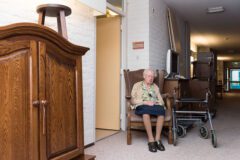A Guide to Medicare’s Nursing Home Rating System

Choosing the best nursing home is one of the most important decisions you’ll ever have to make. However, it can be confusing or frustrating to figure out if a facility is truly as good as they claim to be, and it’s essential to feel like your loved one is safe when they are away from your care.
Fortunately, Medicare assigns facilities with ratings to determine the overall status of their care according to a strict safety assessment. Below, we’ll go over the basics of the rating system and what to look for when selecting a nursing home.
Medicare’s Rating Criteria
Medicare’s ranking system uses a five-star scale to evaluate the quality of both short-term and long-term stays through their Nursing Home Compare site, with one being the lowest score and five being the best. Each facility is ranked based on a combination of the following factors:
Health Inspections
Health inspections are required to be performed annually by Medicare. Each inspection checks for things like fire safety, emergency preparedness, food preparation and storage, medication management, and nursing home environment.
Staffing
This category is designed to consider whether or not staffing meets resident needs. By weighing the number of hours worked by all staff members against the number of residents in the nursing home, this category seeks to address any deficiencies in staffing. However, it’s important to note that it does not account for how many actual staff members work at any given time or the level of care necessary for all residents.
Quality of Resident Care
Quality of care involves several different aspects of a patient’s overall standard of living, including the frequency of bedsores, UTIs, hospitalizations, falls, and flu vaccinations, among several other metrics.
Additionally, nursing homes with a history of serious nursing home abuse citations are not allowed to score higher than two stars. Similarly, newer nursing homes may not have had time to receive a rating.
How Important is the Medicare Rating System?
The five-star rating system remains an excellent way for family members to narrow down their selection of nursing homes. Other important ways in which the rating system is being utilized include:
- Medical professionals, who increasingly rely on the system for nursing home referrals
- Insurance companies who establish service networks based on ratings
- Medicaid, whose plans exclude nursing homes rated lower than two stars
- The US Department of Housing and Urban Development, which uses the system to asses risk in distributing nursing home loans
Limitations of the Rating System
According to a review in JAMA Internal Medicine, hospitals that offer fewer services tended to rate better than those that offer more. This difference was seen most predominantly in hospitals that provided intensive care, cardiology, and neurology services and is likely because their patients required a much more intensive level of care than those with fewer services.
Additionally, according to the same study, many nursing home facilities may also try to skew the rating system by discharging patients without full Medicare coverage (usually of lower socioeconomic status and ethnic minorities) early. While the Medicare rating system offers a decent snapshot into a nursing home facility’s overall standard of care, it’s critical to consider other rating systems that may use different factors for ranking facilities before making a final decision.
Conclusion
The Medicare rating system, while not perfect, offers a great way of gauging a nursing home facility’s overall history for safety and patient care. However, it’s vital to factor in other rating systems into your final decision, as many of the criteria on the Medicare rating system may be incomplete or lack assessing all of the probable issues a loved one might encounter at a nursing home facility.
Regardless of a nursing home’s Medicare rating, elder abuse can occur at even the highest rate facilities. Always keep a vigilant eye on your loved one and visit any nursing home in person before agreeing to send your loved one there. If you suspect your loved one has been the victim of nursing home abuse or negligence, contact an experienced attorney right away.






